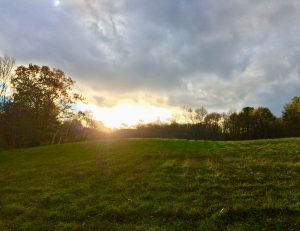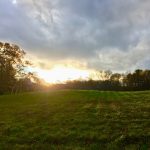 Did you manage to scrape together a decent reason why you were grateful on Thanksgiving? I trotted out, as I probably do most years, some platitudes about poetry, mainly because poetry offers such an effective antidote to the mundane and obvious. Oh, and it can stave off loneliness and transform despair into irony, all while sitting quietly on the printed page. These magical powers were brought home to me recently when, having finished Bill McKibben’s article in The New Yorker “Life on a Shrinking Planet” that summed up the evidence pointing to the end of the Anthropocene era, I came upon a poem by Tony Hoagland.
Did you manage to scrape together a decent reason why you were grateful on Thanksgiving? I trotted out, as I probably do most years, some platitudes about poetry, mainly because poetry offers such an effective antidote to the mundane and obvious. Oh, and it can stave off loneliness and transform despair into irony, all while sitting quietly on the printed page. These magical powers were brought home to me recently when, having finished Bill McKibben’s article in The New Yorker “Life on a Shrinking Planet” that summed up the evidence pointing to the end of the Anthropocene era, I came upon a poem by Tony Hoagland.
He died in October, about my age, traveling many of the same byways, though I never had the chance to meet him. His voice was unmistakable. His poems were biting and beautiful, unapologetic soul searches of the white American male. He had a way of facing up to things — his own worse fears and selves, the impossible predicament of 21st-century life — that I will sorely miss.
Peaceful Transition
The wind comes down from the northwest, cold in September,
and flips over the neighbor’s trash receptacles.
The Halifax newspaper says that mansions are falling into the sea.
Storms are rising in the dark Pacific.
Pollution has infiltrated the food chain down to the jellyfish level.
The book I am reading is called “The End of the Ascent of Man.”
It says the time of human dominion is done,
but I am hoping it will be a peaceful transition.
It is one thing to think of buffalo on Divisadero Street,
of the Golden Gate Bridge overgrown in a tangle of vine.
It is another to open the door of your own house to the waves.
I am hoping the humans will be calm in their diminishing.
That the forests grow back with patience, not rage;
I am hoping the flocks of geese increase
their number only gradually.
Let it be like an amnesia that we don’t even notice;
the hills forgetting the name for our kind. Then the sky.
Let the fish rearrange their green governments
as the rain spatters slant on their roof.
It is important that we expire.
It is a kind of work we have begun in order to complete.
Today out of the north the cold wind comes down,
and I go out to see
the neighbor’s trash bins have toppled in the drive.
I see the unpicked grapes have turned
to small sweet raisins on their vine.
I see the wren has found a way to make its little nest
inside the cactus thorns.
—Tony Hoagland (1953-2018)



I had not read this poem before. Wonderful . Did this poet live in Nova Scotia….I will look it up. I think maybe he did.
I live in Maine and I also love Canada. I am particularly interested in photos I see of the Maritimes. Such a beautiful land.
I don’t think Hoagland lived in Canada though the poem does mention Halifax. He lived all over the world as a child, went to college in Iowa, and died in Santa Fe and, I believe, taught out West — a little hard too tell from the obituaries. Hope all is well with you, Cheryl!
McKibben almost fills me with despair, but then there is the ending of the piece which is lyrical and lovely, like this poem. Thanks, Liza, for your finding these things together, both the mourning of nature destroyed, and humans’ ability to keep going and write about it.
Thanks, Patty. I was also going to mention Andrea Wulf’s “Invention of Nature,” but it was just too depressing to face how far we’ve fallen in less than two centuries when Von Humbold first conceived of nature as a grand interconnected system.
Just love this!
Thank you, Dede!